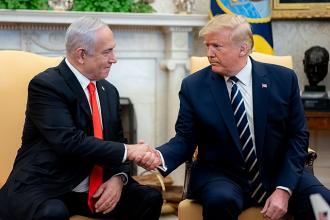Afghan President Ashraf Ghani announced Tuesday the planned release of three high-profile Taliban prisoners in exchange for kidnapped American and Australian professors, in a move to jump-start “direct talks” with the Taliban to end the prolonged conflict.
Speaking on live television, Ghani said the exchange is intended to help bring “peace and stability” to the country.
“In consultations with our international partners, especially the U.S., we have adopted a mechanism and approach to make sure the release of these three men wouldn’t reinforce the … enemy and intensify attacks by them,” he said.
All three prisoners are members of the deadly Haqqani network, a hard-line faction of the Taliban. They include Mali Khan, Hafiz Rashid and Anas Haqqani, a younger brother of the Taliban’s deputy leader and the son of the Haqqani network’s founder. They were held in a government detention center at Bagram air base.
U.S. officials suspected that the American and Australian hostages were being held by the Haqqani network, which is based in Pakistan’s tribal Waziristan region but carries out operations in Afghanistan. The group has been behind the kidnappings of other Americans, including Army Sgt. Bowe Bergdahl and Caitlin Coleman.
Ghani said Tuesday that 11,000 members of the Taliban were still in government custody.
The two professors, Kevin King, a U.S. citizen, and Timothy Weeks, an Australian, have been held by the Taliban since August 2016, when gunmen ambushed their vehicle in central Kabul and abducted them.
The American and Australian hostages had not been released by Tuesday evening, but the three Taliban commanders were expected to be transferred later Tuesday to Qatar, where the group has an office, according to an Afghan security official who spoke on the condition of anonymity because he was not authorized to speak to the press about the matter.
A spokesperson for President Ghani declined to comment on these details.
Both King and Weeks were teaching English at the American University of Afghanistan, a private, nonprofit university in Kabul when they were kidnapped close to its campus. In a statement Tuesday, the university said it was “encouraged” to hear about the “possible release” of the two professors. It urged “the immediate and safe return of our faculty members who have been held in captivity, away from friends and families, for more than three years.”
Earlier efforts to secure their release were unsuccessful.
Immediately after their abduction, the Afghan government said they appeared to have been kidnapped by a criminal gang. But the next month, the Pentagon said that Navy SEALs had attempted to rescue the two men from Taliban captivity in eastern Afghanistan but that the raid was unsuccessful.
Four months later, in January 2017, King and Weeks appeared in a Taliban propaganda video, pleading to be released.
In the video, King said U.S. officials “can exchange us for some prisoners in Bagram,” referring to a military prison in Afghanistan where many Taliban insurgents are held, including the three Ghani named in Tuesday’s deal.
Both men appeared unwell in the 13-minute video. King’s hair and beard had grown long, and he coughed repeatedly, rubbing his eyes as he listed the names of his family members. At one point, as King described the details of their case, Weeks leaned over his knees with his head in his hands, wiping tears away from his eyes. King again asked the U.S. government to talk to the militants about a prisoner swap. “We don’t know how much longer the Taliban will be patient,” he said.
Over the course of their captivity, concerns have mounted that their health is deteriorating. In October 2017, months after a second video of the men was released in June, the Taliban issued a statement saying that King suffered from heart and kidney disease and needed urgent medical attention. Ghani said the decision to go ahead with plans for the exchange was difficult, but that it shows his government’s intention to achieve peace and build trust for pending face-to-face talks between the Afghan government and the Taliban.
U.S. Ambassador to Afghanistan John Bass told the local Tolo News channel that he welcomed the move, calling it “latest in a series of courageous steps that President Ghani and the Afghan government have taken.” The U.S. military spokesman in Kabul declined to comment.
The exchange was long sought by U.S. envoy Zalmay Khalilzad, who has been shuttling between Pakistan and Afghanistan in an effort to restart the talks and bring the two professors home.
He was in Kabul discussing the trade as recently as Nov. 1 as part of efforts to restart negotiations.
Peace talks between the United States and the Taliban had nearly reached an agreement in early September. Then President Donald Trump declared the negotiations “dead” after a spike in Taliban attacks during the final phases of negotiations, including a bombing in Kabul that killed an American and Romanian servicemen, as well as many Afghan civilians.
Since then, there have been informal discussions about restarting talks on a proposed deal, which has involved the withdrawal of most U.S. troops from Afghanistan in exchange for a pledge that the Taliban would not harbor terrorist groups.
The Afghan government has viewed the U.S. talks with suspicion, in large part because they were excluded from them. The Taliban has refused to involve Ghani, calling him a U.S. puppet.
Many ordinary Afghans fear that a deal could bring the Taliban and its conservative brand of Islam back to power.
The past three months have also seen a major increase in civilian casualties in the conflict between the Taliban and the U.S.-backed government, with more people dying in the last quarter than during any other quarter in the last 10 years.















